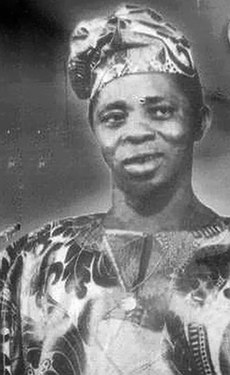THE MINSTREL OF THE MOTORPARK – a review of the film AYINLA, directed by Tunde Kelani
By Femi Olugbile
Growing up in Lagos in the early nineteen-seventies was an interesting experience. Mushin and nearby Idiaraba, where you had your family home, were heavily populated slum areas. They were redolent with the sights and smells of poverty, but also pulsating with colour, and music. Lagos was a melting pot.
It was the period in which Ebenezer Obey’s record-breaking song, Board Members was released. One number was dedicated to the salacious on-again, off-again love story of Olabisi Ajala and his heart-throb of the moment, Alhaja Shade, including how the Alhaja’s unmissable obokun stew was part of the glue that held them together. Mr Okoro, an Igboman who taught English and General Studies to your HSC class in CMS Grammar School, Bariga was a man of perpetually dour countenance. He seemed always to be clad in the same white shirt and black trousers. He wore thick horn-rimmed glasses. One of the lenses was cracked across the eye. The joke among your classmates was that he had no friends and lived alone in a one room apartment containing only a bed, a table and a straight-backed chair. Strangely, a student after school one day caught him standing outside a nearby record store. He was listening to Ebenezer Obey as he sang Board Members. There was a beatific smile on his face as he listened. At length, he bought the record and carried his possession home, his rugged face still creased with a smile of rapture.
There were several motor parks in the Somolu-Bariga area, where you schooled, just as there were in Mushin and Idi araba where you lived. The culture, language and slang of the motor park gave a strong flavour to the life on the streets, where you would often walk. There was one distinctive voice that ruled the streets, blaring out from loudspeakers in records shops and beer-parlours in every corner, especially in the evenings. It was the edgy, gravelly unmistakable voice of Ayinla Omowura, leading his Apala group. Previously you had had the impression that Apala music with its slow sedate cadences, exemplified by the great Haruna Ishola, was music for the elderly and the well-heeled. Here was this man whose music had crossed-over, possessing a provocative edge that got under the listener’s skin. The subjects he sang about were like his voice -racy, exciting. He praised, he cursed, he eulogized, he abused. With every song there was always a refrain the listener could sing along. For anyone who rode in the danfo and molue that were the standard transport of the day, you could be sure to hear one or other of his repetitive choruses issuing from the lips of the driver or his conductor as they manouvred dangerously through the traffic, or crackling from a whining tape recorder on the dashboard.
‘Labule f’owo je gbadun
Mo si nbo lodo re
Labule f’owo je gbadun
Tunde Kelani, in directing what is essentially a biopic, enhanced with creative licence, on this controversial musical genius who lived briefly and died as he lived, has set himself a steep task. How would he pull it off, you wonder, as you settle to watch the film?
It is a labour of love, caressing its incendiary quarry and bringing to life, not just the story of an exceptionally talented man, but also evoking memories of a slice of the lives of Nigeria and Nigerians at a particular point in time. The period settings are meticulously recreated in vintage cars from Mercedes Benz to Volkswagen beetle, in the dressing styles of the people and in the entire ambience and flavour of life.
The viewer is introduced to Ayinla when he is already approaching his prime. His fame is spreading, and his wealth is growing, even if some of it is being creamed off by people close to him. He dresses sharply and likes to flaunt jewelry. He is a man of wit, generosity and an irascible temperament. To borrow the famous words of the British broadcaster Michael Parkinson in describing the great Jazz Pianist and composer Duke Ellington, who he admired and interviewed, we see Ayinla as ‘a handsome man with the sexual morality of an alley cat’.
Lateef Adedimeji plays AYINLA. He kills the role, inhabiting Ayinla, aka ‘Anigilaje’, not just in the song and dance, but in his easy switching from loving husband to doting father to street fighter. Others in the cast include Omowumi Dada, Bimbo Manuel, Ade Laoye and ‘Mr Macaroni’. Football icon Segun Odegbami makes his film debut, falling pat into the story. Ayinla, afterall, was a lover of football, and one of his most famous songs was about the titanic battle of the Challenge Cup final in 1972.
The film evokes nostalgia, and a sense of what might have been if Ayinla had not pushed himself to an early death. The direction of Nigerian contemporary music that we enjoy and share with the world today would have been different. The Afro-Pop and Rap that have gone to Madison Square Garden in New York and O-2 arena in London would have carried a spine of Ayinla’s music, in addition to the Fuji and Fela that have enriched them.
You are forced to conclude that Ayinla did Yorubaland an injustice by dying when his music and influence were just about to take off into the stratosphere. Watching Lateef lift his character with abandon in a couple of dance sequences as the film advances, at one point pivoting on his heels and at another wiggling his back to the ecstatic audience, you see that the music has become the man.
The captions are poorly synchronized with the sequence of the drama.
But Ayinla is a film every lover of the art of music, and everyone who wants to know where contemporary Nigerian music comes from, needs to see.
AYINLA is directed by Tunde Kelani (TK). It is currently showing on NETFLIX

